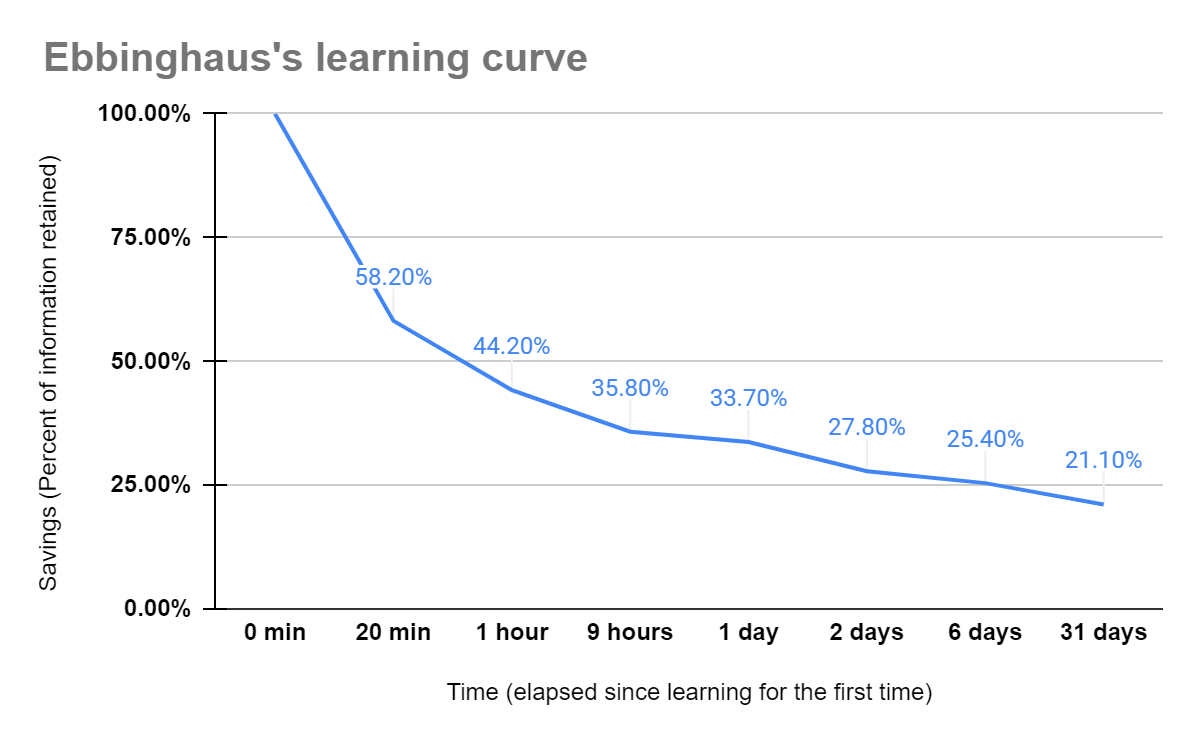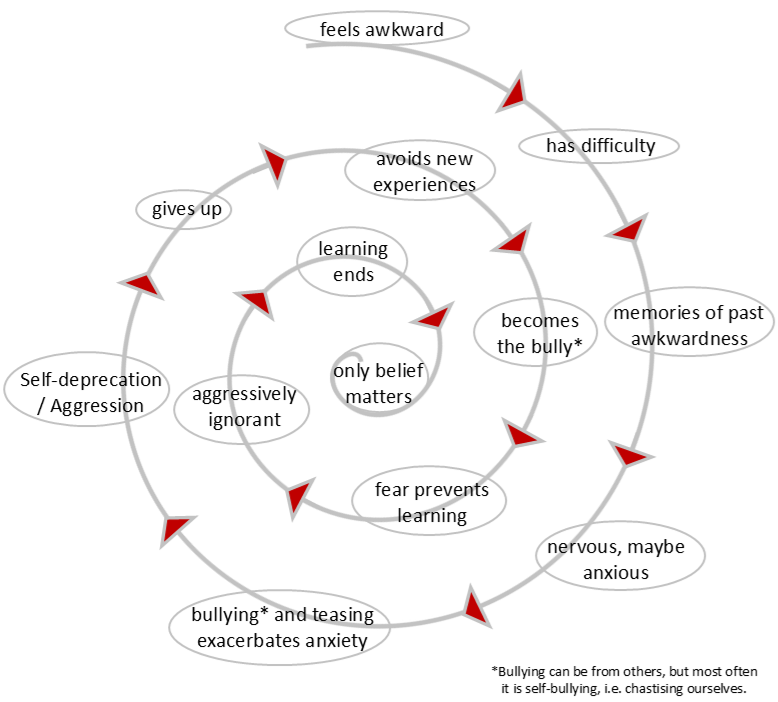Home / Philosophy / Alpha and Omega
Stages of Learning
The Initial Learning Stage
- Learner is introduced to the skill or step in the skill.

- 1 hour after initially learning something, half of what was learned is gone---forever.
- yet, despite the research on forgetting, people will fear that they will appear stupid.
- being subsumed by the awkward stage leads to a sheltering within one's belief systems, which can never be proven wrong, resulting in a cynicism of always being right.
- Ameliorative: Read the article on Shoshin
The Awkward Use Stage

- Everything is awkward.
- The student has an increased awareness, but feels awkward and frequently experiences difficulty.
- Anxiety arises from past awkward stages (oh no, I don't want to look like an idiot/ fool---again!).
- Constant cognitive vigilance over every word and action causes cognitive depletion, an exhaustion that amplifies forgetfulness, mistakes, and errors, resulting in emotional depletion.
- Bullying/teasing of learner's ineptitude may intensify causing anti-learning or performance-based learning, and ultimately undermines learning for the bully and for the victim, which results in a failure of a mastery mindset and perpetuates performance-based learning as normative.
- Be it from bullying, fear of appearing stupid, or cognitive exhaustion, what may follow is self-deprecation (I'm stupid; I can't do this)or aggression (This is stupid; why are we doing this; why I am I forced to do this).
- Ultimately, most people will give up (have been well-trained to give up) at the Awkward stage.
- Ameliorative: There was a time in all things when a person knew nothing
The Conscious Use Stage
- Learner is able to do the skill or step more effectively and easily.
- Occasional awkwardness.
- Still cognitively exhausting; must constantly focus and think (remember) what to do
- Anything outside of the task or skill is too cognitively demanding.
- Ameliorative: Short, focused study / practice sessions
The Natural Use Stage
- Automaticity occurs
- Low to no anxiety
- Low to no emotional drain
- Low to no cognitive fatigue
- The skill is done with ease and is spontaneous, comfortable, and creative.
- This level is reached only after a period of time in which the learner has continued to use and practice the skill.
- Flow (Csikszentmihalyi)
- Complete concentration on the task
- Clarity of goals and reward in mind and immediate feedback
- Transformation of time (speeding up/slowing down)
- The experience is intrinsically rewarding
- Effortlessness and ease
- There is a balance between challenge and skills
- Actions and awareness are merged, losing self-conscious rumination
- There is a feeling of control over the task
Skepticism vs. Cynicism
Skepticism
"A seeker after truth; an inquirer who has not yet arrived at definite convictions.' Skepticism is not 'seek and ye shall find' — a classic case of what is called the confirmation bias — but 'seek and keep an open mind.'" --Michael Shermer
- This discussion of skepticism is in reference to the current usage of the word, not the Greek philosophy called skepticism.
- Reserving judgement until such time as research can be found or performed to prove or disprove a thesis.
- Do ghosts exist?
- Skepticism says "I don't know; I'll have to wait to see what verifiable research can be done to prove yes or no or at least to give a probability of a yes or a no."
- Can plants talk, as in speak English to people?
- Just, no. They have no vocal chords, and even if they had vocal chords, they have no air or gas bladder (lungs) to push air through vocal chords to make the necessary sounds to speak English words.
- But what if they could speak telepathically?
- That's not the original thesis: the original thesis concerned speaking English words.
- Honing our skill of skepticism keeps us intellectually curious and allows us to explore and research any aspect of existence.
Cynicism
- This discussion of cynicism is in reference to the current usage of the word, not the Greek philosophy called Cynicism .
- Stating a thesis that can only be proven true and never proven false.
- She is cheating on me; she wouldn't respond to me for over three hours last night.
- No proof will counter that argument: video surveillance showing she was at home "could have been altered," "witnesses" supporting her fidelity can be motivated to lie.
- The cynic always has a whataboutism waiting to nullify any proof to show there thesis is wrong.
- Eventually, if she does cheat and gets caught, then he is proven "right", and believes he was "right all along"
- A cynic can be proven correct once in a while and that reaffirms to the cynic that all of their suspicions about anything are correct.
- Since a cynic cannot be proven to be wrong, no argument, no proof (that you think is proof) will dissuade them from their belief.
- Bigfoot exists.
- There is simply no way to survey all of earth simultaneously to determine what life forms exist. Even were we to dedicate satellite resources to imaging the whole of the surface, "Bigfoot was hiding in a cave when the satellite went over head.
- Cynicism is detrimental, leading to isolation, loneliness, a distrust of people and instituitions, a diminished idealism, hopelessness, bitterness, and helplessness.
Science and Philosophy, and their pop and pseudo forms
Science
- Seeks a better question.
- Research is not complete without directing where continuance of that research should proceed, which is a longer way of saying that science always seeks a better question.
- Science is fragmentary and focused on parts, not the whole of everything in existence
- Science is not for individualized consumption; science is to build a better science.
Pop-Science (Capitalism's Science)
- Seeks a better (more profitable) answer.
- Research is meant to derive solutions that generate monetary profits contingent on research results, which is a longer way of saying that pop-science is used to make money.
- Focuses on researching parts because parts sell; cannot sell Everything.
- Pop-Science is meant to be individualized---to be saleable to individuals.
- Confusion of conflating process with results.
- Science (not pop-science) such as pharmacology may address a specific medical issue and seek to test various substances to find a medication that would alleviate or nullify that medical issue.
- Pop-science sees an area within medicine that the market has yet to capitalize and after a positive cost-profit assessment, green-lights research to find that profitable medication/solution.
Pseudo-Science
- Seeks to use scientific results to support belief systems.
- Amended, truncated, selective, cherry-picked science results used as "proof" to make a belief system sound rational and logical, and thus correct.
- For example, pseudo-science will conflate fiction and science by distending the particle physics concept of multi-dimensions (which is a mathematical construct in particle physics, not physical realities) to mean parallel selves, alternate timelines, or alternate dimensions of physical existence.
When Pop and Pseudo Merge
Pop-science and Pseudo-Science are often merged to amplify the product's claim, such as anything from Goop. My favorite example if lemon alkaline water. people sell/drink alkaline water for supposed health benefits but then add lemon juice to it for flavor. Once science exposed that as being useless, they spun the idea with new science-y words that lemon alkaline water "restructures the water"A telling example of a belief twisting science concerns lemon alkaline water. This is Dr. Kate McCann. Here's her credentials:
- undergraduate degree cum laude from the University of Notre Dame in 2000
- MB BCh (Hons) from University College Cork 2006.
- Member of Royal College of Surgeons Ireland.
- Former post-doctoral research associate in molecular biology at the Indiana University School of Medicine
- Former Fellow at the Eck Institute for Global Health
- Member of the American College of Lifestyle Medicine
- Member of the British Society for Lifestyle Medicin
- Certification from The Strategic Centre for Obesity Professional Education (SCOPE).
- Currently holds a position in clinical covid research at St. Vincent’s University Hospital, in collaboration with UCD and CEPHR
- has co-authored multiple papers.
- contributes as a lecturer at the Royal College of Surgeons in Ireland (RCSI).
- She also spends dedicated time to myth-busting pseudo-science.
Dr. McCann's response concerning Alkaline lemon water which she summarizes with "So, I should drink my Alkaline water straight for the health benefits? Drink it straight or with lemon- it won’t make any difference to your health."
Note that at the bottom of that page, the first post by "Amber" (no credentials given) is "But… have you drank Kangen water yourself? Long-term? I think you would feel differently if you had. Dr. Michael Donaldson explains the science. It’s more the restructuring of the water, rather than the alkalinity, that makes it more absorbable."
This is on a website; not social media. Dr. McCann's discussion of lemon alkaline water was not some post that Amber stumbled on then shot a reply to. Amber had to find that website, find that article, and decide to respond with that post.
To understand how someone could be that precocious, or that aggressively ignorant, to a scientist, simply review the spiral diagram.
Philosophy
Pop-Philosophy (Capitalism's Philosophy)
- Claims a wider jurisdiction or milieu other than the original philosophy.
- Asserts a direct one-to-one philosophy to life-fix (self-help) relationship.
- Do not confuse a bound copy of a philosopher's work with derivatives of that work.
- Side note: Sold and profit need not mean direct payment of money, but also means monetization through a platform/ ads.
Pseudo-Philosophy
- Truncated, glossed, cherry-picked philosophical ideas packaged together (usually in the guise of self-help) and sold in books and by "influencers" on social media that caters to people's baser instincts, fears, and bias.
- Often, but not always, click-baity.
- Highly suspect if it offers a short-cut, enumerated list Nietzsche’s 4 Ways That Teach You How to Know Yourself or 10 Life Lessons From Friedrich Nietzsche
Pseudo-philosophy merged with pop-philosophy is often found on Youtube where they mix pop-philosophy, pseudo-philosophy (and sometimes with pseudo or pop psychology), and current social issues while using charming words and colorful animated graphics.